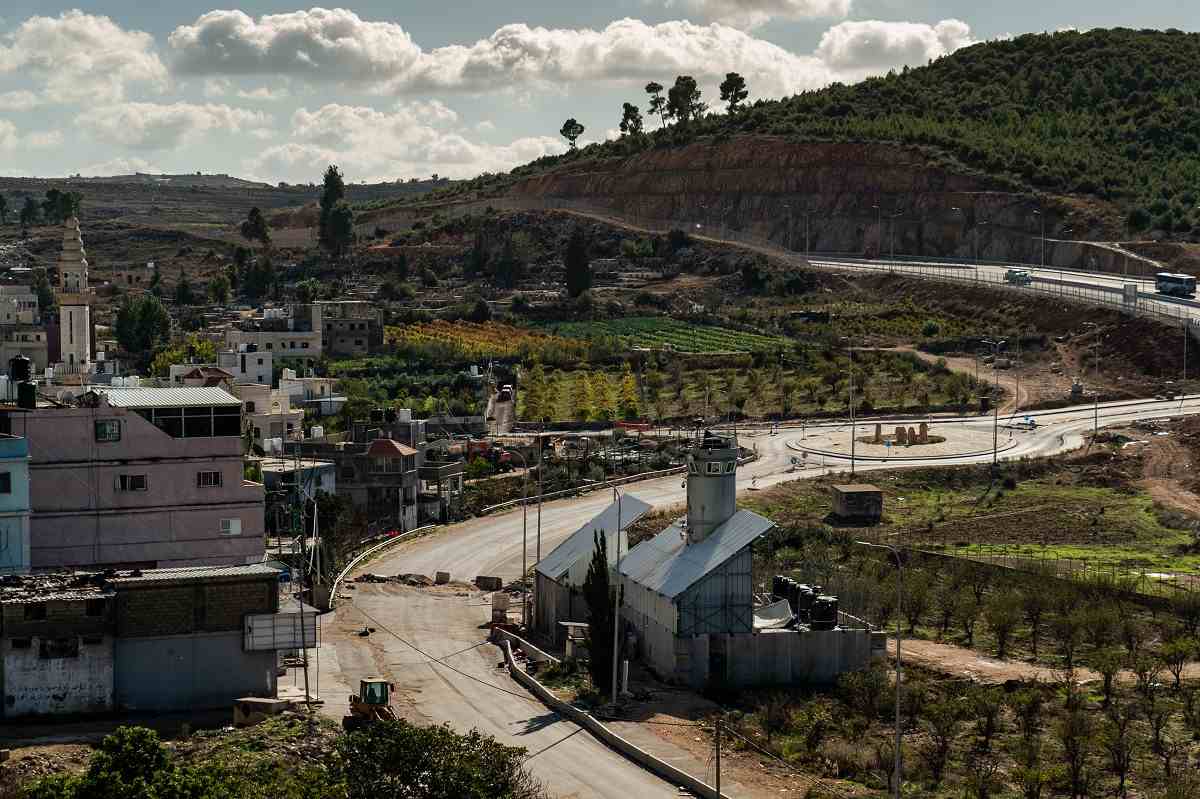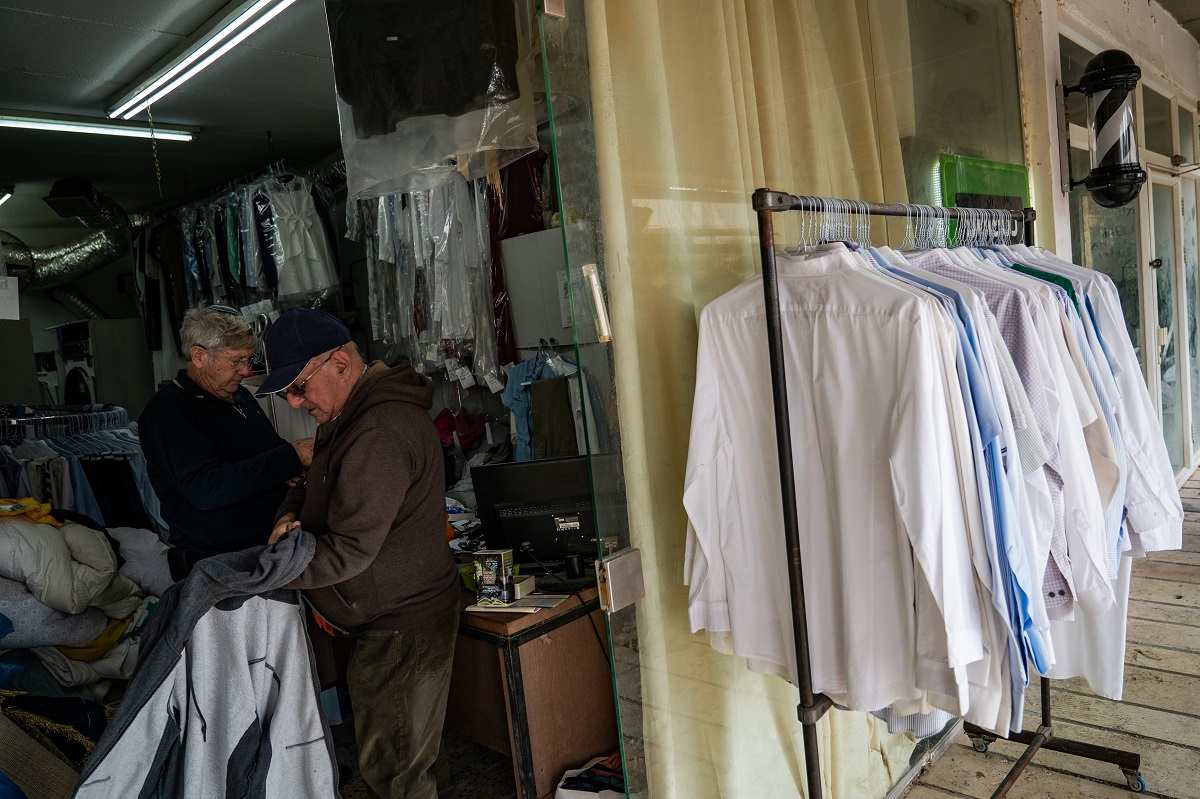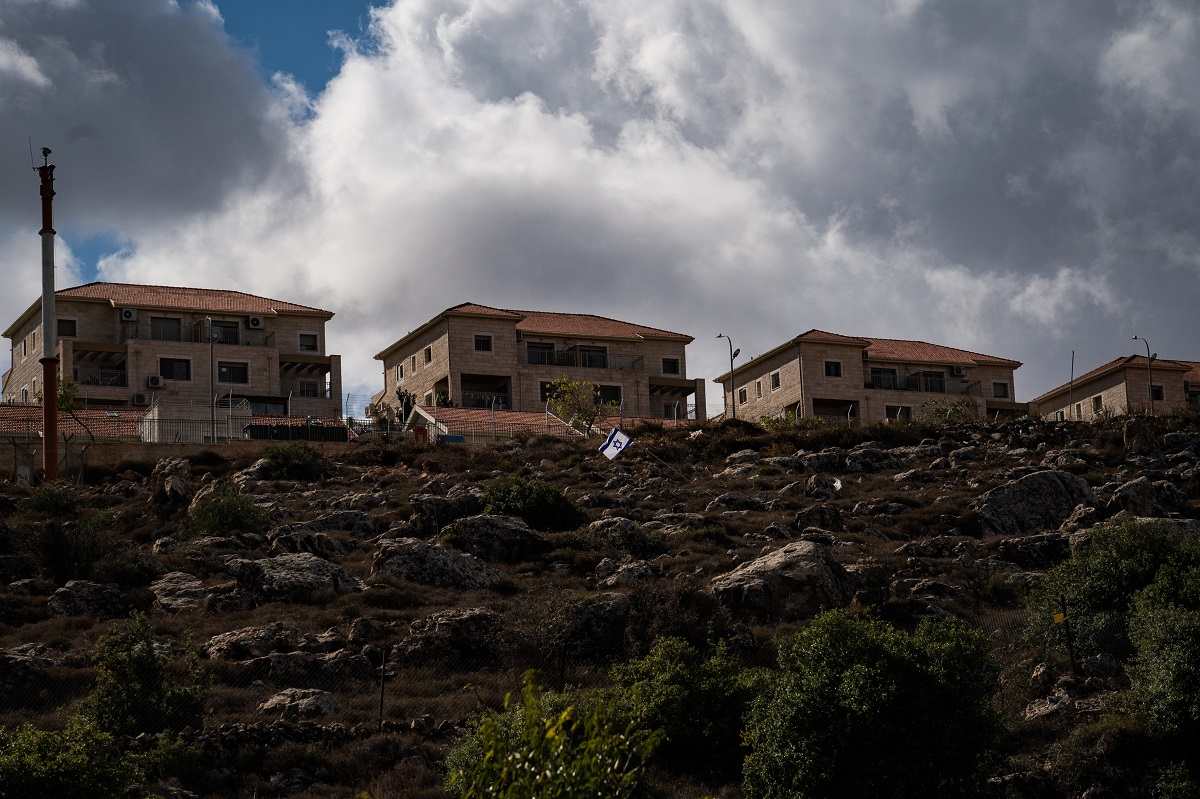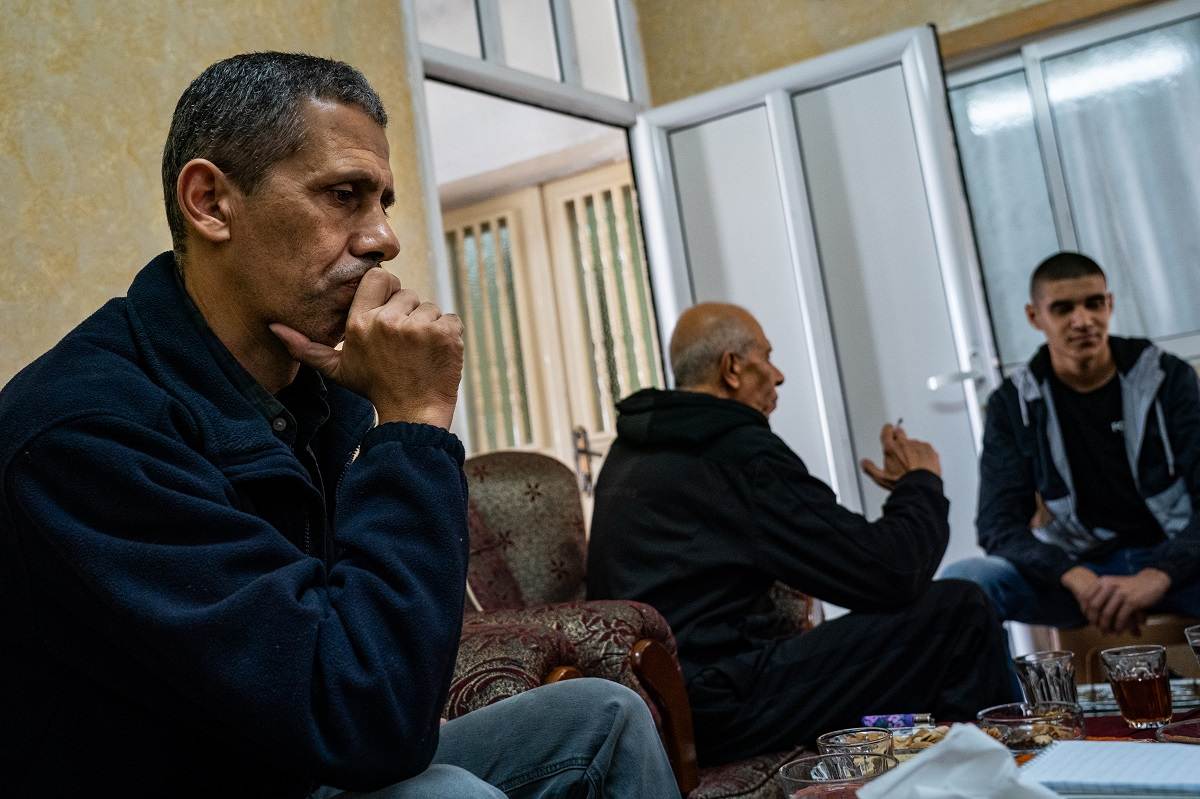
A road is blocked in front of an Israeli watch tower at the al-Aroub refugee camp.
13:23 JST, January 8, 2024
EFRAT, West Bank – It’s been nearly three months since Palestinian workers were allowed in this Jewish settlement, part of a ban imposed by the Israeli government after the Hamas attacks on Oct. 7.
Tens of thousands of Palestinians in the West Bank are now without a source of income; hundreds of Israeli employers have been deprived of the labor that keeps their businesses running.
For Pinchas Houminer, who runs a laundromat in Efrat, it has also come at a personal cost.

Pinchas Houminer, far left, helps a customer inside his dry cleaning business in Efrat.
For decades, a pair of Palestinian brothers – Abdelsalem Mughrabi, 51, and his brother Mohamed, 56 – were the backbone of his laundromat’s operations. Houminer provided them a reliable source of income as they grew their families and sought to build better lives.
In the fraught and unequal context of occupation, marred by violence, discrimination and mutual mistrust, the men developed a genuine friendship, all three say. The relationship endured as West Bank settlements expanded, reaching further into Palestinians towns and villages. But the Hamas attack on Oct. 7, and Israel’s war in Gaza, is testing the ties between the men like never before.
Determined to keep the relationship alive, Houminer has resorted to a new daily ritual.
On a sunny day in November, he loaded a pile of button-down shirts into his white Hyundai sedan, drove through the fortified gates of the settlement and pulled onto Route 60, the main artery that runs through the West Bank.
Five minutes and a checkpoint later, he parked along a steep driveway in the Palestinian refugee camp of al-Arroub. The call of the muezzin, summoning Muslims to prayer, echoed through the valley dotted with olive trees. A young man bounded up to Houminer’s car. “Ahlan!” he said – Hey! – and shook his hand.
The young man’s father, Abdelsalem, emerged from a house flanked by fig trees and greeted Houminer in Hebrew. The men hung freshly pressed shirts in Houminer’s car and retrieved the crumpled batch from the back – that afternoon’s work. Then Houminer drove back down the hill.
This has been their routine since Oct. 7, when Hamas militants rampaged across communities in southern Israel, killing some 1,200 people and taking 240 hostage, according to Israeli authorities. Israel’s retaliatory war against Hamas has killed more than 22,000 people in Gaza, according to the Gaza Health Ministry; the United Nations says at least 300 Palestinians have been killed by Israeli forces across the West Bank, many of them in military raids.
The government has banned most of the nearly 200,000 Palestinians who work in Israel and West Bank settlements from entering Israeli communities.
In Efrat, a Jewish settlement of 15,000 people 12 miles south of Jerusalem, Palestinians from al-Arroub and other nearby villages staffed shops and cleaned homes, often for better pay than they would have received from Palestinian employers.
Even that small window of coexistence has now been shut.
“It’s very difficult, very, very difficult,” said Houminer, a short, bespectacled man with a mop of gray hair and piercing blue eyes, shaking his head as he turned onto the road leading out of al-Arroub.
The car crawled to a stop in front of a checkpoint. An Israeli soldier told Houminer he worried about his frequent excursions to al-Arroub. Houminer said he wasn’t concerned.
“Maybe I’m stupid,” he told a Washington Post reporter who was traveling with him that November morning. “Maybe I have to be afraid.”

The Efrat Israeli settlement in the West Bank, Palestinian Territory.
A ‘very good’ relationship
Houminer was born in Jerusalem to a family that had lived there for generations. But housing was expensive, and he and his wife, Drora, were looking for an affordable place to raise their young family.
In May 1987, he rode a Palestinian bus to Efrat to buy an apartment. “I was a Jew alone with all the bus full of Arabs, and with no fear,” he said. “It was natural, you know?”
Houminer, Drora and their four children moved to Efrat that July, four years after the settlement’s founding, joining about 50 other families.
In December, the first intifada, or Palestinian uprising, erupted, the start of years of violent and often deadly confrontations in Israel and across the West Bank.
“We used to go the [Palestinian] villages freely, no problem,” Houminer said. “But afterwards . . .” he trailed off.
By the early 1990s, the violence had died down. Relations warmed between Efrat and neighboring Palestinian villages, visible from the hilltop settlement. Palestinians were hired by the growing community’s supermarket and new restaurants. Houminer attended the wedding of a Palestinian employee.
He hired Mohamed around then, and a decade or so later, his brother Abdelsalem.
Abdelsalem described Houminer as a “good man” with a sense of humor.
“I was happy and he was happy. Many times he used to leave me alone” in the laundromat, Abdelsalem said. “He used to let me manage the laundry, deal with the customers. We used to see each other more than we see our own families.”
Mohamed retired in 2020 but remained in touch, calling his relationship with his former employer “superb.” His brother stayed on.
Efrat became known as a place of relative peace, a contrast to the hard line outposts where violence by radical settlers against Palestinians has drawn international condemnation.
Efrat’s longtime mayor, Oded Revivi, promoted coexistence with their Palestinian neighbors, inviting them each year to a celebration for the Jewish holiday of Sukkot. Palestinians could get medical treatment at the settlement clinic and pay traffic tickets at its post office.
Clients of the laundromat treated him with kindness and respect, Abdelsalem said. One began to teach him English when he took in his clothes each week. Another gave him sweets on Rosh Hashanah, the Jewish new year.
Years ago, Houminer couldn’t remember exactly when, a Palestinian man tried to stab someone in the Efrat supermarket. But the incident didn’t harden residents’ attitudes against their Palestinian neighbors, Houminer said. Before Oct. 7, he says, he always felt safe.
“The relationship between us and the Arabs around here, the villages here, was very good,” he said.
Efrat expanded, drawing new immigrants from the United States and other English-speaking countries. Drora taught at the local school. Their children grew up and moved away. When Houminer’s daughter Nourit was married in 2006 in the settlement of Ariel, Mohamed got a permit from Israeli authorities to attend.
“I was the only Arab person, but I know the whole family,” he said. “I know people in Efrat better than I know people in the camp. I worked 33 years in Efrat. The people who were sitting at the table, they were my friends.”
When the Mughrabis’ parents died, Houminer went to al-Arroub to pay his respects. And when Drora fell several months ago, Mohamed visited her in the hospital. She died on Oct. 11 from internal bleeding.
“Now I am alone,” Houminer said. “But we had a very good life here.”

Abdelsalem Mughrabi, left, talks about Pinchas Houminer.
Life under occupation
The Mughrabi family came to the West Bank during the Nakba – “catastrophe,” in Arabic – the term Palestinians use to remember the mass expulsion from their lands when Israel was founded in 1948.
The Mughrabis’ father lived with his parents and siblings near the city of Ramle, in the center of what was then British-controlled Palestine. After being driven from their home, they ended up in al-Arroub, a camp established by the United Nations in 1949.
Each family was granted a small one- or two-room house with an outdoor toilet. The Israeli military kept tight security. When Abdelsalem was growing up, he says, his parents told him to take detours to avoid soldiers – and “if you drop a pen in the street and you are passing next to the army, don’t pick it up.”
Life in al-Arroub, home to about 15,600 people, is “difficult,” he said. Many refugees live in “substandard shelters,” according to the United Nations; during the winter, the sewage system often floods. Unemployment is high. Most of those who can find jobs work for the Palestinian Authority, the United Nations or private employers in Israeli towns and settlements.
Israeli raids, and clashes between Israeli soldiers and young Palestinians in al-Arroub, occur regularly. The Mughrabi family has tried to stay out of the fray.
“We don’t participate in anything,” said Mohamed, sitting across from his brother at their home. “None of us has ever been in prison.”
But it’s impossible, the brothers say, to escape the violence and discrimination that constrain their lives.
Abdelsalem and his siblings built their house in the 1990s to create more room for their growing families. Perched on a hill near the entrance to the camp, it’s within sight of Route 60 and an Israeli watchtower.
Ten years ago, Abdelsalem says, some neighborhood children threw stones at the soldiers there. The soldiers retaliated with stun grenades. One grenade came into the family’s house, where his wife, five months pregnant, was standing by a window.
It caused her to miscarry, he said.
“The occupation does not distinguish between the people who are throwing rocks and between the civilians like me who are living in their houses,” Abdelsalem said.
Friendly workplace interactions with Israeli civilians have no impact on the behavior of soldiers, his brother said: They treat Palestinians “with violence and brutality.”
“The punishment for Palestinians is collective punishment.”
‘This time is different’
The shock attack of Oct. 7 upended Houminer’s understanding of his world.
Before, he believed Palestinian militants attacked Jewish Israelis “because they don’t have a state, we occupy their land,” he said. “Now, I know that all of this is not true – the only reason is the hatred of Jews.”
Abdelsalem, stuck at home, now passes his days watching the news out of Gaza with his brothers, gripped and horrified by Israel’s Western-backed bombing campaign and its toll on women and children.
Civilians in Efrat and nearby settlements, newly suspicious of their Palestinian neighbors, are arming themselves and conducting nightly patrols.
Outside al-Arroub, the brothers say, checkpoint soldiers are more aggressive than usual.
Houminer says he no longer knows how to interact with Mohamed – or whether their relationship can ever regain its easy rhythm. He was hurt when Mohamed didn’t call to check on him and his family after Oct. 7. His sons-in-law are in the army.
“I really don’t know what to do,” he said, squinting in the doorway of the laundromat. “I need him, I love him, and I’m working with him for 20 years.”
A woman with a British accent who had come to pick up her dry cleaning chimed in: “We all love him!”
“I really care about him,” Houminer said. “But from the other side, I don’t know that he cares about me the same.”
Hauling shirts to the Mughrabi’s house each day has kept the relationship going on some level. Houminer gets some help with work, he says, and Abdelsalem can still make some money, though it’s a fraction of what he earned before.
In the brothers’ view, the Hamas attack was inevitable. Mohamed described it as a response to Israel’s tightening occupation, the uptick in settler violence and challenges by far-right Jewish activists to the delicate status quo at al-Aqsa Mosque in Jerusalem, a site of deep religious significance to Jews, Muslims and Christians.
“All this accumulated pressure bred the explosion in Gaza,” he said.
He insists the family has nothing against Jews. “At the end of the day, we want to live in peace,” he said.
Abdelsalem’s brief driveway interactions with Houminer leave little time or space for conversation about Oct. 7 or the war in Gaza. “It’s “better not to talk about it,” he said.
He was pained that the new restrictions prevented him from visiting Houminer after his wife died in October. “If the situation was normal, I would’ve gone to pay my respects,” he said.
Mohamed fears “the relationship is breaking apart.”
Abdelsalem, more of an optimist, suggested his long friendship with Houminer could return to normal, “but it will take time.”
His brother disagreed: “This time it’s different.”
Top Articles in News Services
-

Survey Shows False Election Info Perceived as True
-

Hong Kong Ex-Publisher Jimmy Lai’s Sentence Raises International Outcry as China Defends It
-

Japan’s Nikkei Stock Average Touches 58,000 as Yen, Jgbs Rally on Election Fallout (UPDATE 1)
-

Japan’s Nikkei Stock Average Falls as US-Iran Tensions Unsettle Investors (UPDATE 1)
-

Trump Names Former Federal Reserve Governor Warsh as the Next Fed Chair, Replacing Powell
JN ACCESS RANKING
-

Producer Behind Pop Group XG Arrested for Cocaine Possession
-

Japan PM Takaichi’s Cabinet Resigns en Masse
-

Man Infected with Measles Reportedly Dined at Restaurant in Tokyo Station
-

Israeli Ambassador to Japan Speaks about Japan’s Role in the Reconstruction of Gaza
-

Videos Plagiarized, Reposted with False Subtitles Claiming ‘Ryukyu Belongs to China’; Anti-China False Information Also Posted in Japan






















